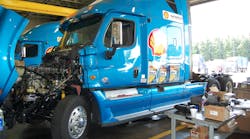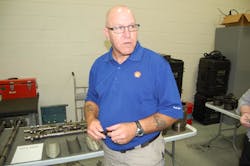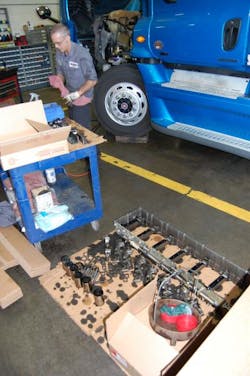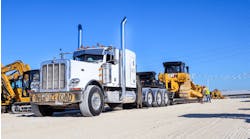Exposing new engine oils to the rigors of real-world trucking operations – especially those being readied for the new proposed category 11 or PC-11 designation by 2016 – is to the minds of Shell Global Solutions experts the only way to “truly know” if new blends will work as expected.
“Lab tests just can’t replace the ‘real world’ and that’s why we spend so much time, money, and effort on field trials,” Howard Hill, Shell’s heavy duty engine oil (HDEO) field trial coordinator, told Fleet Owner at a recent engine teardown event hosted by the company at Clarke Power Services in Greensboro, NC.
[To view more photos from the teardown event, click here.]
In Hill’s view, the single biggest factor governing what kinds of stresses engine oils will face is the how driver’s operate their trucks – a factor that no lab test, no matter how precise, can ever hope to accurately replicate.
Currently, Shell has over 200 customer trucks involved in field trials at the moment that are accruing roughly 25 million miles annually, noted Matt Urbanak, one of Shell’s engine oil chemists.
For example, the particular field trial Shell invited journalists to view involves a group of highway tractors from a high-mileage customer fleet that are testing three engine oil blends – a “reference oil,” meaning a standard CJ-4 15W-40; a semi-synthetic CJ-4 10W-30 blend; and a thinner semi-synthetic CJ-4 10W-30 formulation that mirrors some of the chemistry being considered for PC-11.Hill (seen at right) stressed that customer vehicles are not put at risk during such field trials as Shell drafts what he called “ironclad” contracts that for example to cover any warranty-related issues if the truck and/or engine OEM won’t.
“Those contracts spell out what Shell will provide, what the fleet will provide, and the liability coverage in case something goes wrong,” he explained.
Hill noted that Shell conducts regular oil analysis on all of a customer’s trucks involved in its field tests – paying for them as well – and shares that data with the fleet. He added that Shell also stays close to truck and engine OEMs during such trials and often shares a “deeper set” of information gained from that working relationship with the customers invovled in the field test as well.
Engine teardowns are a vital part of any oil field test, Hill said, and that cost – both for the teardown and the rebuild – is also covered by Shell as part of the field trial contract. “The fleets like that because we do a very thorough job through our partners like Clarke Power Services and that typically gives the fleet more trade-in value for those [test] units,” he emphasized.
The field test trucks Shell showed to journalists are part of a 30 truck fleet of Freightliner Cascadia tractors equipped with 2011 and 2012 model 475-hp DD15 engines equipped with selective catalytic reduction (SCR) emission control technology in coast-to-coast team-driver operations, loaded out on average to 76,000 lbs. and racking up roughly 250,000 to 300,000 miles a year.
Oil drain intervals for those trucks are pegged at 50,000 miles, though in some cases the fleet’s PM schedule changes the oil at 55,388 miles or 10% more than the OEM recommendation. The trucks typically idle 20% of the time and average between 6 and 7 mpg.
Hill stressed that Shell “cherry picks” trucks to conduct engine teardowns upon in field trials like this one, avoiding vehicles that suffer engine component failures and such.“We use oil analysis to determine which truck engines get selected for teardowns,” he explained. “We don’t want engines that undergo major repairs or that get fuel or water in the crankcase because then we’ll get nothing but ‘junk data’ from the teardown. We’re looking trucks that undergo nothing but routine maintenance.”
In the case of these three particular trucks, the teardown on the one using CJ-4 15W-40 oil occurred at 644,208 miles, while the teardowns on the trucks operating on CJ-4 10W-30 and PC-11 10W-26 blend occurred at 669,862 and 539,319, respectively, said Urbanak.
The teardown/rebuild process – which Hill said takes about a week, start to finish – involves each engine component being separated out for extensive examination and photography (some 200 pictures total per engine), with Shell’s experts combing them over for signs of pitting, scuffing, and other signs of wear.
In this particular field trial, all three oil blends provided the same level of engine component protection despite their vastly different chemical formulations – a critical finding as it helps validate for Shell’s lubricant engineers that thinner viscosity oils required to help commercial vehicles meet new federal fuel economy mandates won’t lead to degradation in protective performance.
“We don’t leave many stones unturned when we do these teardown inspections; if oil touches a component in an engine, we’re going to look at it,” Hill stressed. ”The key finding for us is that the low viscosity or ‘thinner’ blends provide engine protection even when the oil drains are 10% longer than the recommended interval. And these field trials are the only way we can truly find something like that out.”





